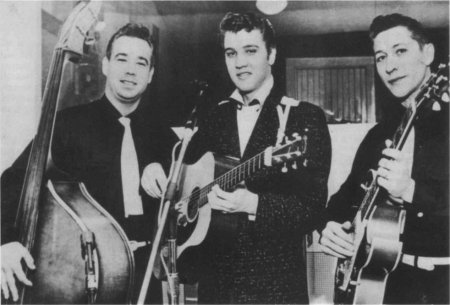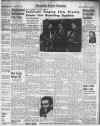|
Thru the Patience of Sam Phillips
Suddenly Singing Elvis Presley
Zooms Into Recording Stardom

GOOD ROCKIN' -- A white man's voice singing negro rhythms with a rural
flavor has changed life overnight for Elvis Presley (center), shown here with Bill
Black (left) and Scotty Moore (right). Elvis will sing for the home folks at Ellis
Sunday. |
|
Press Scimitar Staff Photo |
That Something' Has Captivated Fans Over U.S.
By ROBERT JOHNSON
Press-Scimitar Staff Writer
One sultry night last July, Dewey Phillips flicked a turntable switch with one of his cottin pickin' hands and sent a strange rhythmic chant spinning out from WHBQ.
"Well, that's all right, Baby . . . that's all right, Baby . . ."
The record ended. Radio, like Nature, abhors a void, and Mr. Phillips hastens to fill the breach. "That'll flat git it," he said authoritatively.
That same night, Sleepy Eye John over WHHM loosed the other side of the record on his admirers--and the same voice which had been reassuring Baby now sang plaintive praise of "Blue Moon of Kentucky"
Something Happened
Time didn't exactly stand still, but something happened. Bob Neal of WMPS played the record too. The pop jockeys, entranced by something new, began slipping "That's All Right" and "Blue Moon" in among the more sophisticated glucose and bedlam of Teresa Brewer, Nat Cole and Tony Bennett.
In less than a week, a momentous change began for a young teen-ager, working on an assembly line, who liked to sing and play the guitar.
His name: Elvis Presley.
Elvis' first record was on the Sun label of Sam Phillips' small but ambitious Memphis Recording Service, 706 Union. It wasn't the first time that Sam's Sun had created a good sized ripple in the frenzied circles of record business. Sam is largely responsible for a new trend in the field which the trade publications call R&B (for rhythm and blues) and country (or hillbilly) music, and for making Memphis the R&B capital, as Nashville is for rustic rhythm.
Within a Week
Within less than a week, Sam was frantically and happily trying to press enough copies of Elvis' debut platter to catch up wait a 6000 back-order which hit him before the record had even gone on sale, before it had been released in any market outside Memphis.
And overnight, a restricted but indubitable mantle of fame settled about Elvis, as the record went spinning out across the country--100,000 . . . 200,000 . . . 300,000 . . . still going.
Within a month, Elvis was invited to appear on hillbilly heaven, Nashville's Grand Ole Opry. Veteran entertainers kept him singing backstage, after the show.
On Juke Box Jury
The record was played on Juke Box Jury. "Blue Moon" had been written and first recorded some years earlier by a famous, Grand Ole Opry entertainer, Bill Munroe of Kentucky. Tennessee Ernie Ford, on the Juke Box Jury that night, drawled: "If ole Bill Munroe hears this, he'll just take his li'l ole country band and head back for the hills." Monroe himself, far from being offended, sent Elvis a note of thanks. After Elvis brought it out, six other companies made it with
their stars.
Billboard gave Elvis' first record an 85 score, very high, on both sides. Over a 15 week period, only one other record in the same category had an equal rating, and that was by the established star, Webb Pierce.
Sam Phillips still hasn't figured out which was the big side. "That's All Right" was in the R&B idiom of negro field jazz, "Blue Moon" more in the country field, but there was a curious blending of the two different musics in both.
Two More
Sun brought out two more Elvis records--"I Don't Care" and "Good Rockin' Tonight"; "Milk Cow Blues Boogie" and "You're a Heartbreaker." Billboard's annual poll of disk jockeys for 1954 landed Elvis in the list of Ten Most Promising artists on the strength of them.
Ruben Cherry of Home of the Blues said: "Just three records, and every one has been a hit. People have come in to buy them who never bought records before."
Country music had been thought to have more appeal for older people, but the teen-agers picked up Elvis.\All at once he had crowds screaming for him. He got a manager, Bob Neal, and a regular job on CBS Louisiana Hayride from Shreveport every Saturday night.
He had more money than he ever saw before.
"I got my own office," he said. "It's listed in the phone book---Elvis Presley Enterprises, 160 Union."
Terrific Appetite
He also has enough money to buy all the cheeseburgers he wants. When he has music on his mind, he forgets eating, then gets a terrific appetite which may demand eight cheeseburgers and three milk shakes at a sitting.
To that new office of his come between 60 and 75 letters each day, most requesting pictures.
Elvis at first sent the pictures for free. Now he charges 25 cents for them: on mass orders they cost 8 cents each.
In the past three months he has traveled more than 25,000 miles on personal appearances, played to crowds of 3000. He travels by car with his instrumental teammates--Scotty Moore, hot guitarist, and Bill Black, bass, both Memphians. Their schedule for one week -- New Orleans, Friday; Shreveport,
Saturday; Ellis Auditorium in Memphis Sunday; Ripley, Miss., Monday; Alpine, Texas, Thursday; Carlsbad, N.M., next Friday and Saturday.
Elvis will be 20 this month, and things are moving fast.
Came From Tupelo
Elvis is the son of Mr. and Mrs. Vernon Presley, 462 Alabama. He spent his first 14 years in Tupelo, Miss. The music
he heard was mostly negro, with some country influence from his parents'
brothers.
When he was 13 Elvis bought a guitar for $12.95. He taught himself to play it, still doesn't read music. At Humes High, he lugged his guitar with him, played it with little urging at any time.
The guitar he has now cost $175. He is still peevish about what happened. "The man gave me $8 on the trade-in," he said. "Then he threw it in the waste basket. Shucks, it still played good."
Sam Phillips, who had been a WREC engineer seven years ago, had been scouting for talent on the side. He let it be known that he would listen to anyone
who wanted to sing or play.

Sam Phillips - He'll listen to
anyone. Sometimes it pays
off. |
|
Press Scimitar Staff Photo |
No Big Names
He still will--and that even includes children whose mothers think they have talent. "I've never made a record with an established star yet," he said.
But Sam has some established stars.
He listened to Jackie Brenston's group from Clarksdale, Miss., and recorded his first hit, "Rocket 88." This was genuine, untutored negro jazz, not the white man's music adapted by some of the famous negro musicians. Sam considers Ellington, Lunceford, etc., white man's music.
As word got around, Sam's studio became host to strange visitors. Negroes with field mud on their boots and patches in their overalls, came shuffling in with battered instruments and unfettered techniques. Most tried to impress him with white man's music. Sam outwaited them, listened for a wisp of original melody, a happy sound or an unconventional riff. Beale Street boys came, in cool drapes, moaning melodies Handy never knew.
One Big Oversight
B. B. King of Memphis made "My Baby's Gone" and "3 O'Clock Blues" with Sam, his first commercial record. Sam overlooked getting a contract. He
didn't forget when Elvis came along. There were Joe Hill Louis of Memphis; the Howling Wolf from across the river; Roscoe Gordon, and others, all introduced by Sam.
Phillips brought out "Bearcat," with Rufus Thomas of WDIA, the first Sun Record, about two years ago. It sold 200,000, and he was in business. Since then he has brought out 32 records, now has distribution in every state.
Elvis lugged his guitar into the studio one Saturday afternoon, wanted to make a "personal" record. He sang pop ballads. Sam listened for several hours. "That's All right, Baby" resulted.
In a Class Alone
Sam doesn't know to catalog Elvis exactly. He has a white voice, sings with a Negro rhythm which borrows in mood and emphasis from country style.
Marion Keisker, who is WREC's Kitty Kelly and Sam's office staff, calls Elvis "a hillbilly cat."
While he appears with so-called hillbilly shows, Elvis' clothes are strictly sharp. His eyes are darkly
slumberous, his hair sleekly long, his sideburns low, and there is a lazy, sexy, tough,
good-looking manner which bobby soxers like. Not all record stars go over as well on stage as they do on records. Elvis sells.
If the merry go-round doesn't start spinning too fast for a 20-year-old, he'll end up with enough
cheeseburgers to last a Blue Moon.
Spin 'em again boys.
 This article was originally published
in the Memphis Press Scimitar on February 5, 1955 and is reprinted here
in its entirety with all its inaccuracies and misconceptions regarding
events and with the original photos used cropped where possible. This article was originally published
in the Memphis Press Scimitar on February 5, 1955 and is reprinted here
in its entirety with all its inaccuracies and misconceptions regarding
events and with the original photos used cropped where possible.
article added August 13, 2008
|